#genre analysis
Explore tagged Tumblr posts
Text
Arcanepunk is a strange Genre
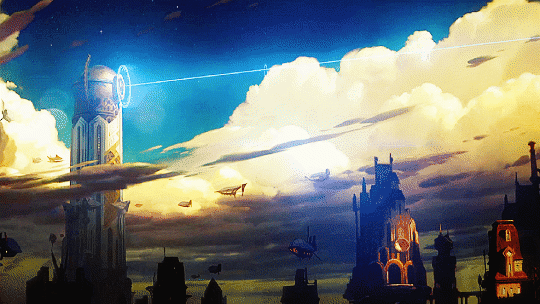
I am trying to talk more about the punk genre. I am trying.
So, let me talk about another punk genre, that is a rather strange example of the punkpunk genre. Because it is one of the rather small genres of the genre group, but the examples that exist are surprisingly strong.
Arcanepunk in general refers to a story or aesthetic, that involves both magical and technological elements. Often times we see it as a world that has some steampunk-y or teslapunk-y technology, but also uses some sort of magic. Though definitionwise there is no reason why it could not be in even higher developed. Shadowrun, which mixes Cyberpunk with magic, is often also considered as Arcanepunk.
One of the reasons that Arcanepunk can be considered rather big, for the fact that it is one of the lesser known subgenre under the punkpunk umbrella, is, that it has some entries that are rather big.
Most notably, of course, there is League of Legends, which very firmly falls into the Arcanepunk setting, and with that all media that comes out of the LoL franchise. Including - yeah, it is on the nose - Arcane.
Other big examples are the aforementioned Shadowrun, arguably some of the Warcraft lore, Warhammer, and also Pratchett's Discworld.
The irony is that for a genre that has some really big franchises tied to it, there is a lot less of other stories within the genre - and the term is just rather unknown, leading also to the fact that there is a lot less of smaller novels and comics that really lean into the genre.
Of course there is also the fact that Arcanepunk once more is not always that strong on the punk aspect.
Let me talk about League of Legends, because frankly: Out of all the big Arcanepunk examples, LoL and Shadowrun are the ones I am most familiar with.
Now, those who mostly know Arcane might actually think that it is fairly strong on the punk aspect. After all Arcane very much places an emphasis on how unjust the system of Piltover and Zaun is. While one could argue that the characters most rising up against the system are the villains, it still does show there is a need to rise up against it. And the council of Piltover is most certainly not depicted in a sympathetic light.
However, if you look at League of Legends, the lore is often a lot more... complicated. Because League of Legends has the issue of "there is no real main character". For the most part they want players feel good about playing any of the champions, but given that some of those champions are colonizers, if not just outright fascists. But again, you can play them. So they all need to be main characters of sorts. Hence: The overall narrative cannot go and say: "Actually, this is super bad and we should focus on the rebellion against it." Which would actually put more punk into the story.
It really makes me wonder, how Riot plans to deal with this going forward, given that they decided that Arcane is now part of the main canon - but I digress.
You can see a similar thing (from what I know) in Warcraft and Warhammer. Due to all the factions being equally playable, a lot of the associated media tends to be held back onto picking sides - even though it is bitterly necessary.
And Shadowrun... Oh, well. Shadowrun is another issue entirely. One that I will talk about seperately. Some day. Not today.
Well, at least there is still the Discworld series. Because those are very much on the punk side of things. After all, more than anything Pratchett was simply based.
#cyberpunk#steampunk#arcanepunk#arcane#league of legends#arcane netflix#world of warcraft#warhammer fantasy#shadowrun#genre analysis#punk punk
8 notes
·
View notes
Text
I love how, depending on the genre, the average person can either be extremely resilient—brushing off attacks that would land a normal person in the hospital, or extremely weak—dying from having their head being pushed a little too hard into a wall.
And the thing I love most of all? When these two Very contrasting physics is somehow shoved into one media. Who Framed Roger Rabbits immediately comes to mind, but I don’t know many others.
Personally I think it’s often a missed opportunity in crossovers. How does an average person in Metropolis compare to the average person in Gotham? DC vs Marvel?
#media analysis#analysis#genre analysis#dcu#dc universe#marvel#who framed roger rabbit#just some thoughts#let me know if you have any recommendations#I’d love to know what else does this
3 notes
·
View notes
Text
Unsure the current trending opinions on Across the Spider-Verse, but:
Beyond the fact that the art fucks 1,100% and the way it made me look back on Into the Spider-Verse with incredulity to see how far back Across’ foreshadowing was set up-
It’s a coming-of-age movie, in the most heartwrenching and unapologetic ways. The whole damn trilogy is a coming of age story. It takes the nice happy ending we get in Into the Spider-Verse, and goes ‘No story remains wholly happy, if you don’t pause the scene after the kisses and hugs.’
And not in a bleak way, or at least I think that’s something Beyond the Spider-Verse will - hopefully - hammer home better than any of us will see coming. But...
There’s the whole overarching thing in Into about “No Expectations” and how this applies to both the expectations his family has and the expections of being a Spider-Man. Well, Miles did it. He had to fight that fight, and he won it at 14. It changed the course of his whole fucking destiny.
And...Across the Spider-Verse comes knocking on the door and goes “Yeah, that fight isn’t one you fight and win once. The endless expectations that you subvert and slay at 14, are coming right back around at 15. This is a lifelong struggle, and old happy endings will always become more bittersweet as you get older.”
And, as Across has started to lace for us - and, as I think and hope Beyond will run home for us - it’s also going “And this is alright. It sucks. And it’s not fair. But also, fuck destiny and what’s expected of you, and you’ll find family to help build a better future alongside.”
Beyond being on the bleeding edge of animation and having a story being executed to precision, the Spider-Verse movies are also a coming of age story.
#something something 'this ties to the disillusionment we are left with from peter b & gwen & even peni after what goes down in the movie'#'but also the fact the same movie lays the seeds of them trying to recognize their failures and step back up to help miles and be better'#as like...what i think is a fucking throughline of a good coming of age story#because isn't that a thing that we all experienced growing up? a disillusionment with family or friends or the society around us?#and - at least in the good fiction IMO - it helps say 'hey. that's not right.' and 'hey make sure you're there for your loved ones'#and 'the world is possibly broken and almost certainly trying to break you down in some way. build a better future for yourself.'#'build a better future for those who come after.'#and that's something i think is so fucking important to see as a kid; and as a teen; and to be reminded us as an adult#the monkey speaks#into the spider verse#across the spiderverse#across the spiderverse spoilers#atsv spoilers#the best type of meta analysis#genre analysis
17 notes
·
View notes
Text
I've been thinking about starfield's "nasapunk" thing and like that's a dumb ass name for the aesthetic, but I feel like there is something of value in there. For one it's pretty interesting that the entire bit seems to be taking military realist scifi and removing the military elements, which is a pretty fascinating vision of the future and where power lies in said future. And unlike other retrofuturistic aesthetic revivals like, ray gun gothic or alien style 70s industrial scifi, the nasa aesthetic is not the a past generation's 𝘷𝘪𝘴𝘪��𝘯 of the future, it was an element of present reality in the 80s, 90s, and early 00s when stuff like the space shuttle and the iss were actively being developed and in the news all the time, but then stopped being a reality when public science funding evaporated in the late aughts. And I don't think starfield is really going to interrogate the loaded context of it's cool spaceship go brr aesthetic, but it's also an interesting who else is getting in on this aesthetic cause it's just like starfield, the "realistic(?)" buzz lightyear reboot that nobody saw, and matt damon's the martian, i guess? Like there's something here, but so far the only people compelled enough by the nasa aesthetic are so milquetoast and uninterested in the deeper implications of this nostalgia-futurism.
6 notes
·
View notes
Text
[Genre Analysis] Mechas & Military Science Fiction Readings
Source: https://www.hulu.com/series/gargantia-on-the-verdurous-planet-050e1ebb-3727-4ca7-9d49-c5e3443531b8 By: Peggy Sue Wood | @pswediting This maybe does not need to be stated, but just in case you didn’t know: Mecha and Military Science Fiction readings go hand in hand. For those that don’t know what Military Science Fiction is, it is a subgenre of science fiction. Works within this…

View On WordPress
0 notes
Text
No but holy shit the implications of “I think there is someone he likes, because he has been acting… weird.”
Just imagine El’s confusion over her brother. California is obviously not that great for the Byers. In that very intro scene, we see El making her diorama (which, as sweet and lovely as it is, it ends up getting nothing but ridicule in school), Joyce getting frustrated with a client, Jonathan hurriedly hiding the fact that he’s smoking weed; things are not picture perfect. But Will? Will’s in his own world, in a dreamland of his own, holding to his friends and his life back home by painting it with a focused and tender look in his eyes.
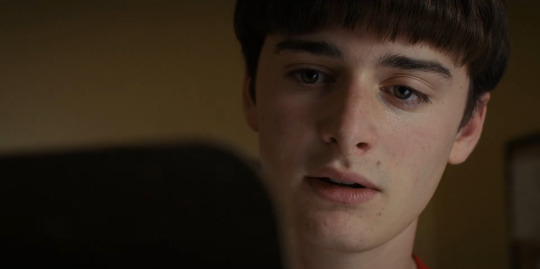
While everyone at home openly struggles with something, our first glimpse of Will this season is something precious and untainted, a struggle that doesn’t develop until much later when he chooses to face his feelings.
We never see Will acting, quote, “weird.” Will has never really been a character that we see out loud. It all lies underneath. It always has. And when I think about that underlying struggle and yet deep fondness, it just. God, it breaks me.
Imagine Will months prior, starting up this project. He picks out a giant canvas, a page that covers his entire easel. Maybe this is his first time using paint as his medium. Maybe not. But whatever the weather, it’s bigger than anything we’ve ever seen him craft. Ever.
Imagine El’s excitement. She learns that Will is a great artist, and she knows it the minute he shows her a single piece. After that, she’s interested in his art, and yet… it’s at the worst time, because he doesn’t let her into his room, anymore. But she knows that he’s working on his easel day in and day out. The minute he’s home from school, he’s playing music, painting again. Maybe he throws out one or two torn-up drafts. Maybe he skips dinner over it. Maybe he ends up so tired that he’s fallen asleep with paint on his face and doesn’t even know it until she points it out.
She’s impressed and she wants to see what he’s doing, especially because he seems so passionate about it all the time, but he never lets her. He bites his lip and shakes his head. He guards it with his very life. And El is left wondering what has him acting so secretive. So nervous. What is the emotion, where is the energy coming from?
It’s out of place. It’s weird when moving to California isn’t as fun as whatever is on that canvas’ face.
So it must be love. Of course it is. Of course it’s for someone, some girl. What else could it be? What else would make Will seem that out of place, seem that… crazy?
And for all of it to be happening upward of six entire months? That painting didn’t take a day or two, I mean, look at it. It must’ve taken him weeks to get in every detail.
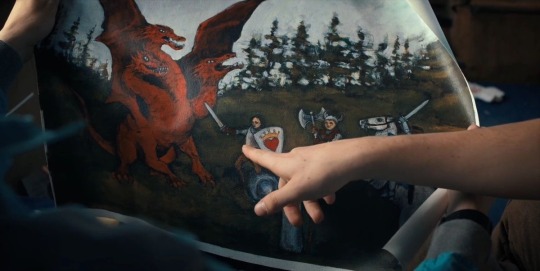
And all of it. Every little smile. Every dreaming thought. Every ounce of passion. Everything. Was because of Mike.
God.
God.
#byler#the screaming and crying genre of byler#I had a good but exhausting day and I guess I’m here now#send help#will byers#byler analysis
606 notes
·
View notes
Text
I've been thinking a lot about Leonarda's not-death ever since it happened back in April.
("What death?" you might ask, to which I say: "EXACTLY!")
Back in mid-April, Vegetta and Leonarda were mining together in a one-block wide tunnel. A mob (a Petriman) got between the two of them, and Vegetta told Leonarda to step back while he took care of it. At this point, they'd spent enough time together that he trusted Leo to listen to him.
Instead, she was killed by the same sweeping edge bug that killed her siblings.
-
Vegetta's reaction here is what's really interesting to me. Unlike most other parents on the Island, there are no shouts or tears – only a very brief "Hmm" and then silence. He very quietly takes stock of the situation, saying "Vegetta, no" and wondering aloud why Leo didn't defend herself. In chat, Foolish says "It was a bug, right? LAG" to which Vegetta slowly responds "Yes, lag. Bug." (Despite this, Foolish still asks "WHAT HAPPENED" in chat, though Vegetta doesn't reply).
Instead, he creates a slightly wider space in the tunnel where Leo's body is. He continues quietly taking stock of the situation, wondering why Leo didn't defend herself (which is what necessitated his intervention). She'd been lagging a lot that day, and he figures that must be the cause, and eventually when Leo re-appears out of thin air in the middle of the cave and collects her stuff, she confirms that the lag got to her and that's why she didn't fight the mob.
Now here's where things get interesting:
Vegetta checks the tab list. Online, it's just him, Leonarda, Roier, and Foolish. He quietly tells Leonarda "The body has already disappeared, and without a body, there is no crime. Nothing is happening. Did you die?" Leo shakes her head, and Vegetta shakes his head too, and in the kind voice he uses sometimes with Leo, he says: "I believe you have not died. Where is the body? It isn't anywhere, no mija. If it was a mistake, it was a mistake."
Leo says: "I saw Diosito (God) pa, and I was scared. God, what am I doing here?" and Vegetta laughs, telling her it's alright. Leo says "No pasa nada (don't worry / nothing happened)" and Vegetta says: "And the people who are watching us have not seen it either." To Foolish and Roier, he messages: "Secreto."
And the funniest thing about this is it worked.
Not a single person spoke about it. I saw this entire event go down live and I didn't see a WHISPER of what transpired among fans. I can't even remember if the QSMP official accounts talked about it (they sure didn't mention it in Vegetta's recap of the day). We could discuss this in meta terms of course– Leo was having known lag issues that day, Vegetta's beloved by the admins so of course they're willing to turn a blind eye rather than slap a "?" over Leonarda's life on the Eggstatistics, but meta talk isn't what I'm interested in here.
I'm interested in q!Vegetta, the weird "god-adjacent" aura he's got, and the way the universe bends to his will.
Before he took a break from the server, Rubius seemed to be a caretaker for the Eggs who died (for example, he was present when Maxo, Quackity, and Mariana & Slime said their final goodbyes to Trumpet, Tilin, and JuanaFlippa). Because of his role as an "angel" and some of his dialogue during the early days of the server, it's not a stretch to say he probably came to collect any Egg who lost a life. I can imagine he did the same when he saw Leonarda die – that is, until Vegetta said "And the people who are watching us have not seen it either." Realistically, we know Vegetta was saying this to Chat (and possibly the admins as well), but again, we're looking at this from an "in-universe" perspective.
I wonder if Vegetta was aware of Rubius' role, and this was his way of telling Rubius "No. I won't allow that to happen." We know Rubius has a soft-spot for Vegetta (and we also know that Rubius was cast out of heaven several months later) so it makes me wonder if these two instances are connected.
Either way, this isn't the first time the laws of the QSMP universe have bent for Vegetta, and I certainly don't think it'll be the last.
Rubius or no, Leo didn't die that day.
Vegetta made sure of it.
#i talk#QSMP talk#AAAAAAAAAAAAAAA#I FOUND IT#I wrote this post TWO MONTHS AGO#MAYBE LONGER!!!#I had clips and links prepared but I have no idea where those went#I'm not gonna bother saving this as a draft and risk losing it again#I have nearly 70000 drafts on my main blog but by some miracle this got saved in my art blogs' drafts instead#than the stars#Anyways. Leo was killed by a whale a few days later because Foolish was in the bathroom lmao#''powerful god-adjacent man who bends the laws of the universe'' vs. ''man whose entire life is a series of sitcom episodes''#I still really want to write out that ''QSMP genre'' thought I had ages ago. It's still relevant and always will be relevant#but anyways#I wrote this months ago on very little sleep but DANG. It's a banger.#I miss writing analysis stuff I wish I was in a headspace where I could do this more like I used to#QSMP analysis
406 notes
·
View notes
Text
Also, adjacent idea I wanna throw into the pile: Nursing-home 'masquerade society', aka some group in the nursing home having fun getting up to the antics in ways where the employees can't prove there's a connection.
why aren't there more mysteries that take place in nursing homes & retirement communities. i want to watch a group of deranged retirees-cum-amateur-detectives combine their powers of:
decades of life experience
boredom-fueled busybody shamelessness
access to the most gossipy next-door-neighbors in existence
"I am too old to be arrested and/or give a shit" attitude
and solve crimes. this should be an enormous subgenre.
#the monkey speaks#genre analysis#discourse and discussion (tropes)#writing inspiration#to consume and enjoy
42K notes
·
View notes
Text
Thinking about the crazy love triangle situation in Blue Eye Samurai and debating heavily with myself on how I'd like to see it conclude. And yeah this discussion can be thought of purely as shipping, headcanons, and fandom fun. But when analysing the show and engaging with it in a more in-depth, almost-literary level, it's impossible to dismiss who Mizu's potential love interests are and how different endgame romances would affect her character arc and the overall story and themes.
So in this post I'd like to look at the love triangle a bit more closely, and speculate on where the story will take this.
DISCLAIMER: It is my personal interpretation of the text that Mizu is non-binary—I use this as an umbrella term denoting any gender that does not adhere to the binary restrictions, norms, and expectations of what it means to be either a man or woman in a particular society; it's not just an androgynous "third gender" that exclusively uses they/them pronouns. Thus, while I personally believe Mizu is not strictly a cis woman, she does still identify with womanhood, despite definitely feeling a level of detachment from it due to living as a man for so long. With that being said, I will be using she/her pronouns for Mizu in this post, but please note that this is purely personal preference. Everyone is free to interpret the text the way they like. That's the fun of fiction. Now, without further ado, let's proceed.
Okay so, thinking about the pairings on a purely surface level, and even before i got into the show, I was pinning my hopes on some lesbianism going on between Mizu and Akemi, and the show does hint at this; in Ep1, during their first encounter in Kyoto, there is the famous slow-mo shot of their eyes meeting, Mizu's lips slightly parted as she is unable to tear her gaze away from Akemi, while sweet string music plays in the background. This is clear romantic framing, and a marker of attraction. If Mizu was a cishet man, there would be no question that this is a potential love interest.
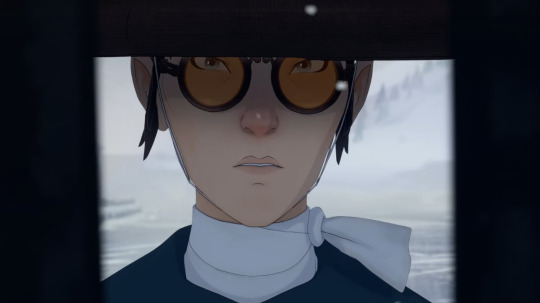
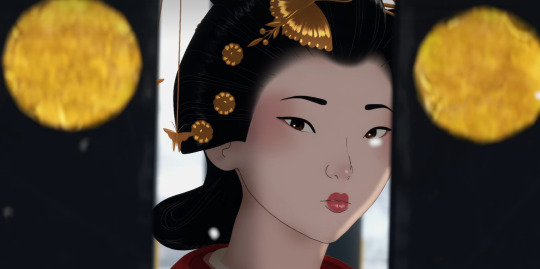
But then, in the same episode, we meet Taigen, who is introduced to us firstly from hearing Akemi's father describe him as "a fierce and undefeated young samurai", the "best swordsman in the best school" and "a fisherman's son from Kohama [...] whose rise reminds [him] of [his] own."
In the next scene, we meet him in person as Akemi's fiance, and he seems sweet enough. He even gives her sweets! In exchange, Akemi gives him gold, and he feels a bit ashamed that he doesn't have anything better to offer her. But Akemi accepts him and his gift wholeheartedly and flirts with him a little, which makes him smile kinda shyly.
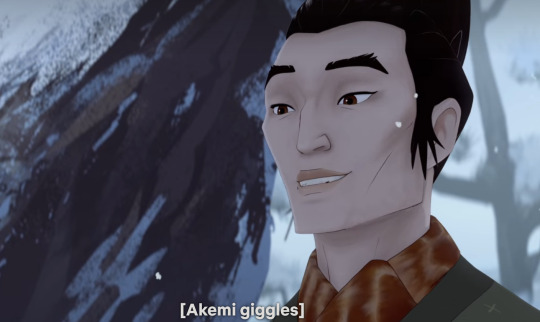
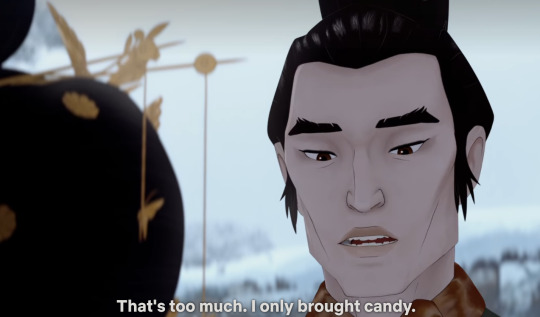
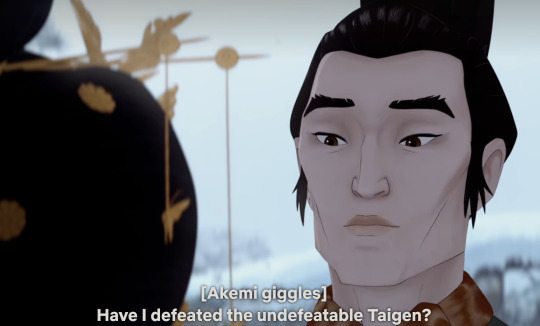
When Akemi confirms their engagement, Taigen is in disbelief because he has no status or noble background, but Akemi reassures him.
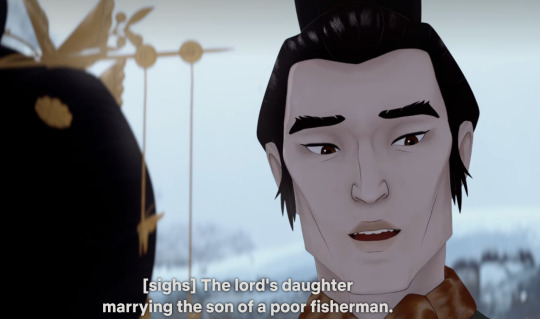
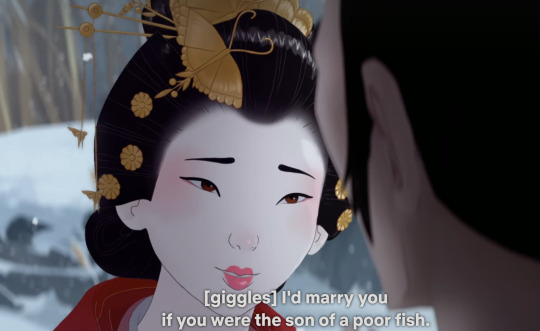
So from these first few scenes, we're introduced to Taigen as an honourable and strong samurai, but also as a man who is sweet and gentle with the woman he is about to marry, as well as aware of his own inferiority when compared to Akemi's high station.
Our view of him then changes as his true self is revealed: he is an arrogant and smug bastard among his peers, but more importantly, he is the terrible bully from Mizu's childhood.
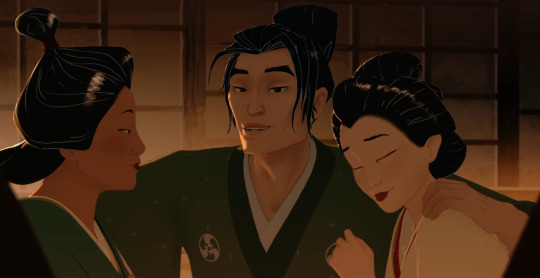
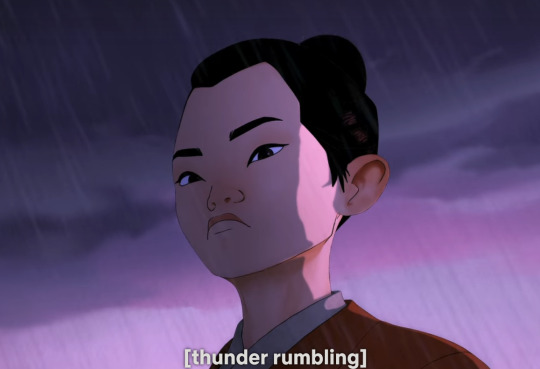
And it is this side of Taigen--pompous jerk and unrepentant xenophobic bully--that we continue to see as the show goes on, and it's safe to say that this is his real self, sans any pretense of humility and modesty. Around anyone who isn't an outright superior in terms of class and power (ie. Akemi's father, the shogun), Taigen never hesitates to assert his own authority and "greatness."

But as the show goes on, he gets caught by Heiji Shindo's men, and then tortured. And that's when we see, okay, turns out he's not that bad. He's honourable; "honour" is not just meaningless and superficial pedantry for him, but an internalised, guiding principle.
He was a cruel asshat throughout Mizu's childhood, but in a prejudiced and xenophobic society, he was just playing by the rules. As a child, he knew he was at the bottom of society, but when met with someone even lower ranked than him (Mizu), he can project all those prejudices and insecurities onto someone else. This way of thinking--"if you can't beat 'em, join em"--is what allowed him to climb up the ranks despite being some dirt poor kid from an abusive household*.
*Well, that combined with his cismale privilege of course, because this would not be an option for a woman in similar circumstances.
Thus, his upholding of honour also exemplifies how Taigen embodies the ideals and rules of his society. His insistence on duelling Mizu is another more blatant example of this. He doesn't want revenge like Mizu does. He wants to be accepted by society, within the bounds that society has placed, and that means that his only two options following his defeat at the Shindo dojo were to either chase Mizu down and get his damn duel, or kill himself for his humiliating defeat.
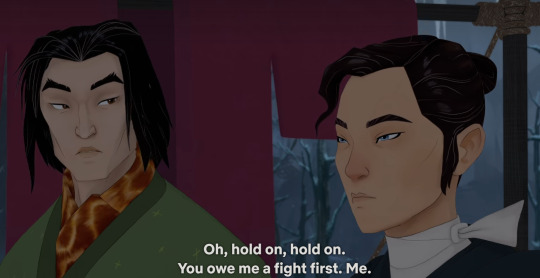
Now! Moving on from Taigen, let's go back to the other end of this little love triangle: Akemi.
Mizu and Akemi only properly meet in Ep4. During their first meeting, when Akemi tries to poison Mizu in Madame Kaji's brothel, she compliments Mizu's eyes, calling them "beautiful."
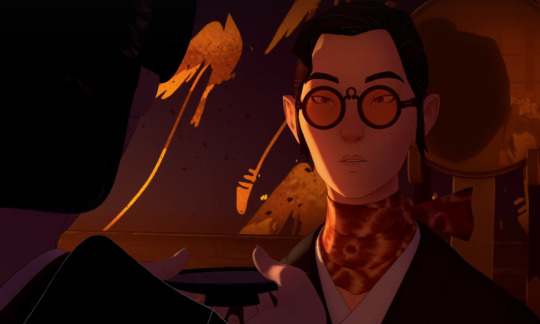
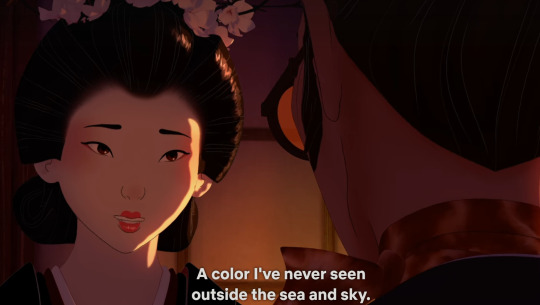
This seems to genuinely take mizu off-guard for a second before she coolly plays along. We know that Mizu recognises Akemi from the get-go, and thus sees through Akemi's ploy from a mile away. It's also safe to assume she'd expected false flattery, because Mizu understands full well that this tactic is how women get what they want: by using their 'feminine wiles' and playing up their naivety and innocence. But even so, it's interesting that Mizu actually seems surprised by Akemi's compliment.
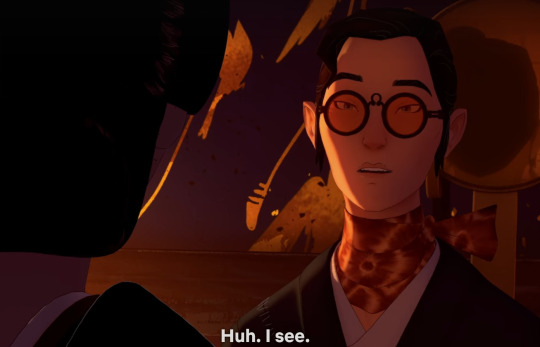
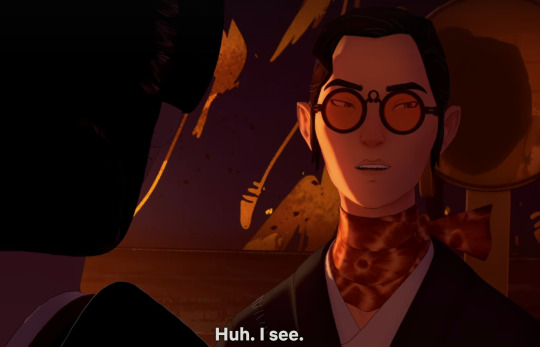
Then, after Mizu subtly taunts Akemi by lying about Taigen's death, she and Akemi have a bit of a scuffle, and then we get to Mizu saying this:
"Women in our world don't have a single good option. Except you, like some magical forest creature. You could have anything you want, but then you beg to eat trash."
(no screenshot because it's quite a long line but you get it)
Here we see Mizu's opinions on the marginalisation of (mostly poor and under-privileged) women stated outright, and underlying her words is also resentment. Because even though she and Akemi have shared experiences of female oppression, Mizu, unlike Akemi, was also poor, from a rural village, and is a racial minority. Mizu is triply oppressed, while Akemi only faces one primary form of oppression, and to someone as embittered by the world as Mizu is, to see Akemi "beg to eat trash" is a slap in the face, practically tone-deaf to the other injustices around her--injustices which Akemi has not shown much, or any, acknowledgement for at this point.
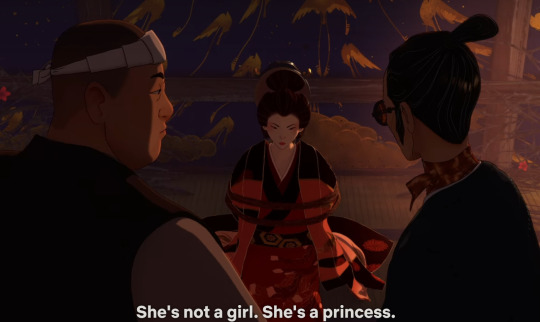
Then, after this scene, Mizu kills Kinuyo, and this unsettles her to a degree we've never seen from her before. She is visibly distraught, and the entire sequence hammers the theme of this episode (and arguably, a large portion of the show) into our heads: women in this world suffer. And even though Mizu is well aware of this fact, to commit this act is so visceral that is shakes her to her core, and it's what ultimately leads to the ambush of the Thousand Fangs.

But before the ambush, Mizu and Akemi talk a little again, and during this time Akemi taunts Mizu some more.
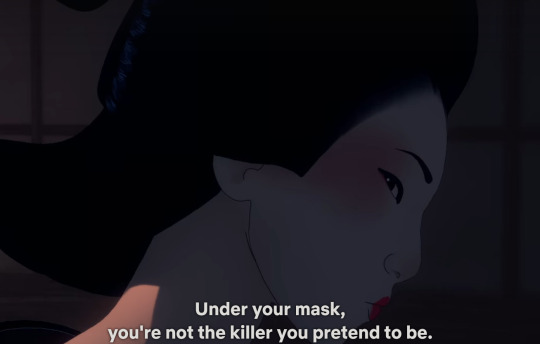
Right now, Mizu is exhausted to the point where (I believe) she even downs some sake, despite not usually drinking. Thus, worn down, she cuts Akemi's ropes and tells her, "Just go." Akemi recovers from her initial fear of Mizu's blade and taunts her some more, accurately seeing through Mizu's facade of coldness, recognising the raw anger there, and says this:
"I thought you had to be something special. Your face isn't even so scary. You're just... angry."
At this, Mizu is amused and compares Akemi to Taigen ("I see why he likes you. You're just like Taigen when we were children. A fucking brat.")
The reveal that Mizu and Taigen knew each other in childhood surprises Akemi, but before either of them can say more, everything goes to shit.
That's when we get to Ep5. This episode focuses primarily on Mizu, the central piece of this love triangle, and does the most out of all the episodes to shed some light on her character and goals, fleshing her out to be more than just the vengeful, highly proficient samurai we've seen thus far (symbolised by The Ronin), but also a person who is capable of love, domesticity and gentleness (symbolised by The Bride). But in the end, Mizu rejects both these ideals, instead becoming an Onryo, who is neither guided by pride/honour, nor love.
By 'reincarnating' into an Onryo, Mizu is able to win the day and save the women in the brothel. However, as she has now fully embraced her status as an Onryo, and is exhausted physically, mentally, and emotionally, she lets the Tokunobu clansmen take Akemi away while Akemi's screams echo in her ear.
Mizu says this choice is for Akemi's own good, that Akemi's better off; because Mizu is jaded and weary, and cannot afford the luxury of idealism, and thus must always be strictly practical and realistic. So of course that's why, in her view, yes, Akemi should not be wasting her time in a brothel where women are exploited and abused, nor should Akemi be so naive to think that her marriage with Taigen is even still possible. However, regardless of Mizu's views, it is not for her to decide, because though Akemi is privileged in some sense, she is still trapped and voiceless, and deserves the right to choose her own destiny.
But as it happens, in the end, though Akemi did not choose who she gets to marry, she DOES get to choose her next move when Edo burns down.
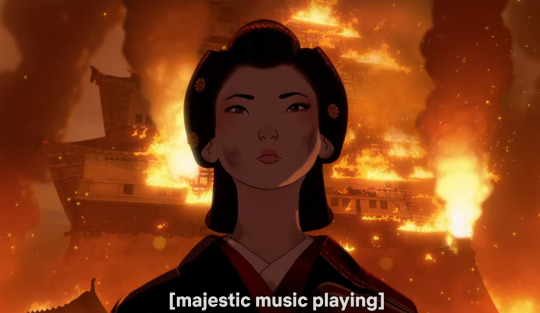
"I want to be great."
This one line is the key to her entire arc, which is only just beginning. We see she quickly has acquired the affection and good graces of the shogun's son after their wedding night and consummation, and with Madame Kaji and the girls now serving her, Akemi will only grow to become a prominent political player.
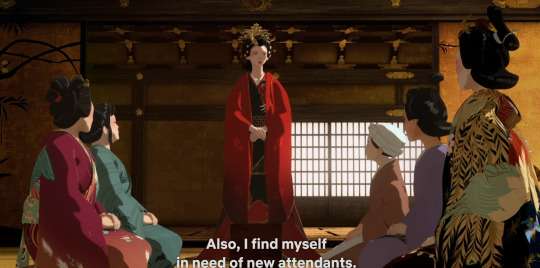
NOW, only after analysing the characters as they are within this season, only can we speculate how their arcs will continue as the show progresses.
First and foremost, I will reassert the popular opinion that Mizu and Akemi are foils. The climax (pun intended) of Ep7 illustrates this as it parallels the turning points in both Mizu's and Akemi's arcs:
Mizu melts the steel of all her loves and shames, the people she's collected: the broken blade wielded by both Chiaki and Taigen, Akemi's knife, Ringo's bell, Master Eiji's tongs - this symbolises her beginning to accept herself, and in doing so, also accepting the help of others;
Akemi consummates her marriage with Takayoshi Itoh, gains his affection, and cements her position as a woman in the shogun's palace - this symbolises her taking charge of her situation, no longer playing the damsel, but using her position to her advantage, empowering both herself and the underprivileged women around her.
These are thus two directly contrasting, diverging journeys:
Mizu's arc moves inward (yin). It is an internal path of self-love and self-discovery, focused on finding peace and tranquility inside herself, and this involves allowing herself to let others into her life, opening herself up to friendship and empathy once more.
Akemi's arc moves outward (yang), it is an external path of growth, transforming from a naive, caged princess to a powerful woman and a force to be reckoned with.
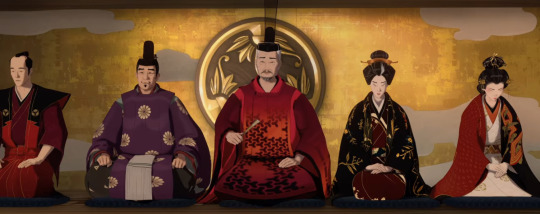
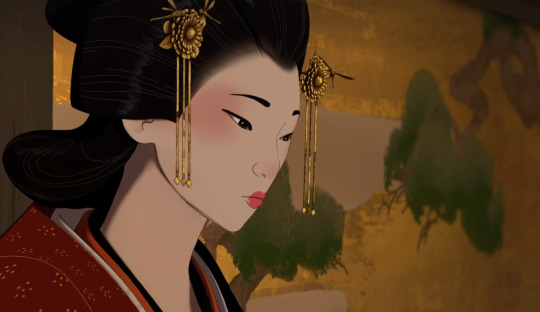
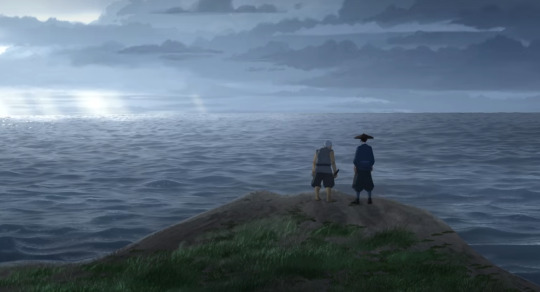
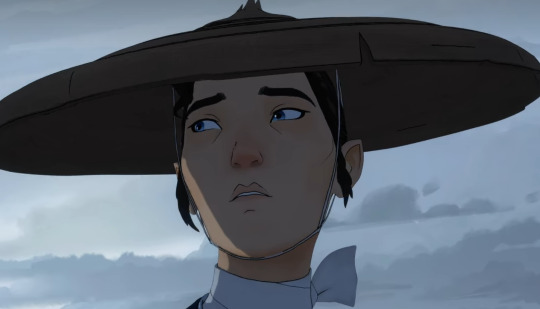
Akemi is always dressed in red, even her eyes are a bit of a reddish-brown rather than brown-black like most other characters, and in her penultimate scene she stands against a backdrop of flames. She is fire: quick-tempered, passionate, full of energy. Red is powerful, authoritative, and in eastern cultures, it is associated with prosperity.
Mizu is blue: her eyes, her sword, her clothes. She is also named after water; it's where she goes to recover, reflect and meditate. Water is fluid like a brook weaving around a stone in its path, always changing and adapting, it is graceful, it is beautiful and ruthless, tranquil yet swift.
Thus, in the future, I expect we will see plenty of political manoeuvring and intrigue in Akemi's plotline, where she fully embraces control of her life, and begins to take action to help others as well, realising that her own oppression is just one piece in a much larger picture. Her main conflict is with society.
In direct contrast, Mizu's main conflict is with herself. She must realise that her desire for vengeance is a projection of her own deep-rooted self-hatred. Her arc must move towards unpacking her feelings and trauma so she can be at peace with herself and allow space for love in her heart. Because as we saw in Ep5, Mizu had come extremely close to achieving peace and joy, as she had not only loved Mikio, but also had briefly believed that Mikio had loved her (and accepted her for who she is) as well.
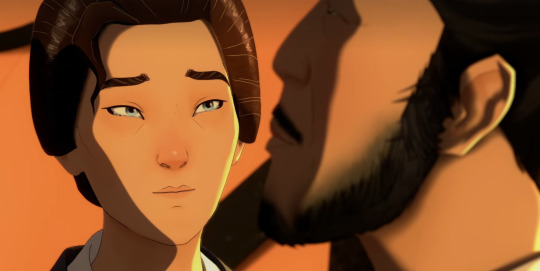
Thus, assuming the story is not planned as a tragedy, Mizu will likely end up getting her vengeance, but it will not satisfy her, because it is not what she needs. What she needs is to let go of the Onryo within her and to reconcile both The Ronin and The Bride within herself, as she is both a fighter and a lover, but not a monster.
(Edit: I recommend checking out this post by @stylographic-blue-rhapsody for a much clearer analysis about Mizu'a symbolism as Ronin, Bride and Onryo!)
And now that we've mostly covered each of the characters individually, we can finally get to the main point of this post: the love triangle.
--
Let's talk about Option A: Akemi.
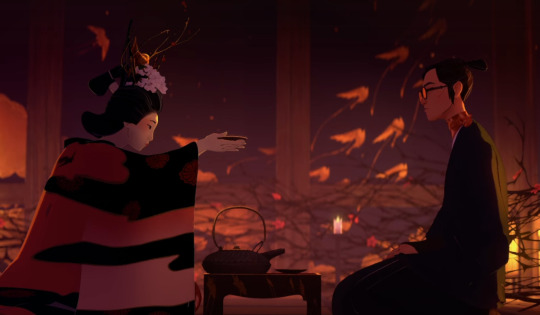
As I covered extensively earlier, Mizu and Akemi are foils, a yin-yang pair. But while they play off each other very well in a thematic sense, I personally believe that a serious romance between them will be more complicated if they become endgame. This is because Akemi's natural resolution is to embrace a position of power and influence, where she has both freedom and control over herself and to make much-needed changes in a prejudiced society. Meanwhile, Mizu's natural resolution is the opposite; her happy ending would to find a peaceful life where she is safe and free from prying eyes, and able to be her true self.
Thus, it would make very little sense for Akemi to forfeit power and run away with Mizu and start a humble life together. Akemi wants to be great, and that is absolutely what she deserves. On the other end of the spectrum, it would also make little sense for Mizu to dedicate her life in service of Akemi, such as acting as a bodyguard or something similar, because a life in a palace full of court intrigue and conspiracies is far from what Mizu needs to be happy.
With that being said, if Mizu/Akemi is endgame, and assuming their overarching character arcs do not shift directions, their love story would likely be either tragic, doomed, or bittersweet. I do absolutely love this type of story because personally I'm a sucker for catharsis, so it would be very interesting if the writers do decide to take this route.
Also, as a note, please do not take this as me dunking on this pairing. This is just my personal opinion and analysis and I completely understand if you disagree!
--
Then, of course, we have Option B: Taigen.
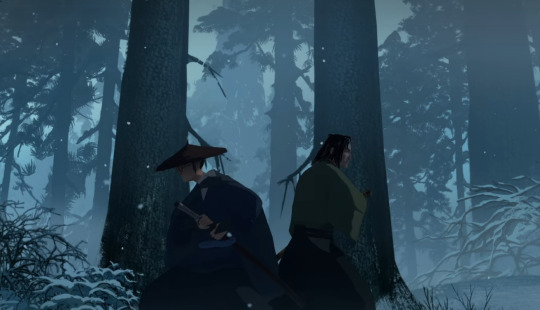
Between Akemi and Mizu, Taigen is a bit of a free-floater here, because Season 1 leaves off at a point where his arc is very ambiguous as to where it's headed. While Akemi climbs for greatness and Mizu goes on a journey across the ocean to (presumably) discover more about her heritage, we have little clues about where Taigen is headed. And if I'm being honest, I'm sure he has no idea either! He still hasn't reclaimed his honour, so he would be unable to rejoin the Shindo Dojo; he's been rejected by Akemi; and while he showed loyalty to the shogun, the shogun is now dead, and all the shogun's men who had witnessed his "humiliating" death were left to die by Lady Itoh, who is now pulling the strings within the palace.
Therefore, Taigen has very few options here.
And when considering his role in the story is as Mizu's begrudging ally, his arc will undoubtedly be focused on unlearning his xenophobia and misogyny, the latter of which we have not seen yet, but is surely present. Now, whether he will do this in Mizu's presence or absence will be unknown until we see Season 2. Following the Season 1 finale, he might return to Kohama and wait for Mizu there as he learns humility and remorse over his past cruelty; or maybe he will follow Mizu to London, and the two of them will continue to butt heads until he finally admits to himself that he cares for Mizu more than he would like to admit. There is no room for doubt that his growing feelings for Mizu are more-than-platonic, because we all saw him get turned on by sparring with her in Ep7 lol. Thus, regardless of the exact choice he makes, I am sure that his overall arc will be focused on redeeming his character.
Now, when it comes go redeeming him, I know there are many who simply don't want him redeemed because he was such a jerk to Mizu, and while yes I agree he was awful, I do believe there is also nuance to his character.
Previously I've discussed in great detail the colour and elemental symbolism with Mizu and Akemi, but have yet to touch on how they relate to Taigen. So, let's talk about that for a second.
While Akemi is red and Mizu is blue, Taigen is green.

Green is a complementary colour to Akemi's red. Complementary colours are directly opposite each other in the colour wheel; when mixed, they neutralise each other, but when put side-by-side, they form a pleasing and impactful contrast that boosts the brightness and prominence of both colours. This mirrors Taigen and Akemi's relationship. They are an "ideal" pair because they complement each other very well, and bring out each other's most prominent traits. Mizu's comment about their similar "brattiness" comes to mind here.

Green is also an analogous colour with Mizu's blue. These colours are sitting right next to each other on the colour wheel; their natural similarity makes it easy for them to form a cohesive overall appearance, but using both in equal amounts will make a design overwhelming and too busy. Thus, the best way to use analogous colours is to make one the dominant colour, while the other will serve as an accent. I feel this also speaks to the dynamic in Taigen and Mizu's relationship. They came from the space place, both from nothing; they're both strong fighters who love the sport, and work well together when fighting side-by-side; however, they butt heads too easily, mirroring how analogous colours can be too overwhelming when used in equal amounts. Thus, to work together in harmony, one has to be the dominant colour, while the other serves as the accent. In this case, the dominant force would be Mizu, as she is the protagonist of the story, while the accent would be Taigen.
By fulfilling this role as an "accent" to Mizu, Taigen's character would easily be slotted in as a the love interest. This is in contrast with a Mizu/Akemi relationship, whereby Akemi is Mizu's foil before she is Mizu's love interest. This is because, by being a love interest, a character usually takes a backseat in the story, serving the plot and the themes by playing a purely supportive role, and this is not possible in Akemi's case because her character exists to parallel and contrast Mizu (red and blue), and not to support her.
It is possible to serve as a supporting love interest in Taigen's case however. And this is because he, unlike the other characters, does not currently have a definitive place within the story. He initially served the plot as an antagonistic force, but now as he is slowly unlearning his prejudices and becoming a better person, he can no longer serve the story by acting purely as a rival.
Instead, he will serve the story by literally supporting Mizu. And this relates to Taigen being earth, which is steady, firm and reliable, unwavering in loyalty and principles, hardworking and rooted in stability, which is seen in Taigen's staunch and inflexible obedience to the traditions and rules of society. These traits are what make him a perfect samurai, but not a good man. However, unlike most people in their world, Taigen is still capable of change and redemption, which is why Mizu says that he has the potential to be great. Not great by way of power or glory, but great in character. Already, he is honourable to a fault, and does not betray Mizu even after she technically robbed him of everything he was striving towards. And when he was shot by an arrow in the chasm, he did not hesitate a second to tell Mizu to use him as a human shield and save herself.
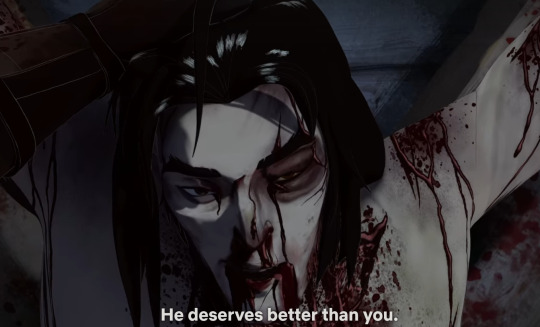
The trigger for his redemption is Mizu. If she had never beat him in that duel, Taigen would live on to become a man like Akemi's father. Cruel, power-hungry, controlling, conservative. But through Mizu, Taigen's sharp edges are ground down, much like water that wears down the stones in a river.
Where Mizu and Akemi's possible love story would be a clash of wills, full of passion and even heartbreak, a possible love story between Mizu and Taigen would be the wearing down of souls. Mizu would make Taigen a better person, and in turn Taigen would dedicate his full respect and support to Mizu as his equal, thus getting her to slowly open up and love herself. Already, Taigen has grown enough to admit (begrudgingly, and in his own Taigen way) that Mizu is better than him; though, clearly, he still has a long way to go, as he still calls Mizu a demon shortly after that.
But basically, Taigen is a very simple man (his main goal now is "to be happy"), and Mizu has great depths that he cannot yet fathom. For this love story to work, it has to begin with Taigen changing for the better. If he succeeds in that, and is able to accept Mizu for all her complexities, I believe that they will make a formidable pair. And though he'd likely still throw a jab or snarky remark at Mizu every now and then, I think he'd come tl wholeheartedly admire Mizu as a brilliant swordsman and a kind soul. Thus, should things work out and this be endgame, Taigen would be able to provide Mizu with what Mikio could not: an idyllic life that is not built on a lie, but mutual trust, respect, admiration, and equality.
Or hey, maybe they could both make their own dojo together! I don't know.
(Edit: This post by @rinandsketches does a great job at delving into Taigen's character and a potential Mizu/Taigen relationship if you'd like to read more about this angle!)
--
Now, as I move on from Taigen, there are a couple more options on how to resolve this love triangle and that includes Option C: Ringo.
In this option, Mizu does not have an endgame romance with either Akemi or Taigen. In this route, she finds peace and love through friendship, solidarity, and a found family between herself, Ringo and Master Eiji—a bunch of outcasts in society who make a strong trifecta of sword-makers.
Also, as an aside while I'm talking about Ringo, I'd like to point out that I believe his element is air and his colour is a neutral grey; he is talkative, easy-going, wise, curious, light on his feet (stealthy) and free-spirited, which are all traits linked to air, and traits that complement Mizu nicely, as he is capable of getting Mizu to open up and trust others again, while Mizu helps him reach his true potential for greatness.
--
And finally, there's Option D: Polyamory.
This is basically an "all of the above" option, in which everyone wins and it's a super duper happy ending. It would also be awesome to get some polyamorous representation, and seeing the dynamic between Akemi/Mizu/Taigen play out would be very entertaining and refreshing. So, you never know, this just might be the true endgame!
--
AAAAND with that, I close my extremely long analysis of what is essentially Mizu's love life. Whatever the final outcome of this love triangle though, I just hope it will be well-written and satisfying to all the characters' respective arcs. (Also I just want Mizu to be HAPPY goddamn it because she deserves the world and her coochie eaten out)
Now, I highly doubt anyone will read any of this (especially not until the end!) but that's fine. I just have so many thoughts and feelings about this show and I just needed to get this out of my system lol! But if by some miracle you did read this far, I wholeheartedly welcome any sharing of thoughts and ideas because man am I obsessed with this show! But of course, if we have an opposing opinions, please be respectful when letting me know; I am very open to friendly discussions.
#blue eye samurai#mizu x taigen#mizu x akemi#mizu blue eye samurai#mizu x akemi x taigen#blue eye samurai meta#also if you ask me PERSONALLY. based on my own analysis which you can read above. personally i'm placing my bets on option b (mizutaigen)#and this is simply bcs i think mizu deserves nice things and that includes getting dicked down and pampered and worshipped#whoops who said that#also mizu deserves to live a life where she can hand taigen's ass to him on a daily basis. ykwim.#BUT i am def open to a change of opinion regarding the mizuakemi rship as the story progresses#i just dont want the writers to reduce akemi into nothing but a love interest for mizu#the only way i can see a happy mizuakemi endgame scenario is if blue eye samurai becomes purely an angsty romance story#in which case then yes i fully endorse the akemi ending <3#but that would probs require a whole genre overhaul? bcs currently the show is firstly an action-epic where the romance is just a subplot#but even tho i dont reeeeally want a mizuakemi endgame i still DEF want mizu & akemi to be romantically and/or sexually involved plsss <3#like they cant have that slow-mo shot between the two of them as their first encounter and NOT DO ANYTHING W IT!!!#also i want mizu to be at LEAST a little sapphic plsplspls#shut up haydar#meta dissertations.pdf#haydar's fandom posts#i wrote this whole thing while delirious and covid positive
410 notes
·
View notes
Text

and turbo? ugh, he loved the attention.
closeup :

#turbo#turbotime#turbo wreck it ralph#turbotastic#me when I don’t know how to tag this post#pawesome art#he scares the shit out of me . i want to get him pregnant#i watched the like two hour long analysis and what a joy it was 2 be vinidicated#HE IS SCARIEST VILLAIN . most evil and manipulative even#once again i insist turbo would do numbers on the analog horror genre#wreck it ralph#king candy
145 notes
·
View notes
Text
One further thing of note is how the gears can start grinding as a work or series keeps going on and the genre(s) start to shift.
Talking of Harry Potter anymore isn't really to be done, but I know this discourse existed in the fandom so it gives me my best shot at a universal example: how you're supposed to look at the Useless Adults in the first book (or three) and how they do or don't become less useless as the series gets more serious. For example, the discourse over Dumbledore having left Harry in an abusive home. When you're dealing with this in the first book, you're more steadily in 'kids fantasy' territory and you have to realize that...
And then you look at this as of Book Four, or Five, or Six, or Seven. You look at this when the series has gotten darker, and grimmer. 'Adult who purposefully left a child in an abusive house, no matter the rationale given' gives a different tone then...because it is a different genre by then.
The way longer-running crack-works can sometimes metamorphose into more serious works provides a similar case. When you're a crack-work...well, you're a goddamn crack-work. But when the story starts becoming more serious, or more tragic, or just less cracky...well, then your characters sometimes are seen having to address just what it is they did (that was originally laughed off) back when the work was crack.
Trying to figure out how suspensions of disbelief shift as genre/tone shifts, or whether you can still excuse stuff that happened when a work was originally running on kids-media conventions, or so on...well, sometimes that can lead to arguments where people are talking past one another, because they're coming into it with different stances on what genre the work should be viewed by and what conventions are 'the correct ones'.
Which I have no helpful answers for, I just think it's pertinent to point this out as a thing that can and does happen.
Maybe not the biggest culprit behind the Radioactive Bad Takes on this website, but the one that’s bugging me the most lately: Please, I am begging you, learn what genre conventions are and read the text accordingly.
Fiction is not reality and pretty much every genre of fiction has certain standard ways in which it deviates from reality. And I’m not just talking about how we shouldn’t nitpick the physics of how Superman is able to fly. There will be ways in which the characters’ behavior and relationships will be informed by the genre as well and it makes just as little sense to judge them by realistic standards as it does to complain about something in Star Wars being scientifically implausible.
For example, “Adults are Useless” is a well-recognized trope in children’s literature. But that’s not because children’s authors are all going around writing adult characters who are terrible parents or teachers. It’s because the protagonist of a story written for children is almost always going to be a child, and the protagonist of the story has to get into trouble and solve problems themselves for the story to be any good. Yes, in real life, teenagers shouldn’t be fighting in a war. But if the grown-ups stepped in and stopped the teenage protagonist of your action-adventure series from fighting, there would be no story.
Does that mean the grown-up characters in that series are evil people who use child soldiers? No, because we accept a child being in these kinds of situations as a conceit of the genre of children’s fiction, and we interpret the characters and their choices accordingly. We don’t apply a realistic standard because the very premise is unrealistic to start with.
Another example: An adult hitting a child in real life is horrible. But if the child is a superhero, and the adult is a super villain, and they are in a cartoon, then we can’t read it the same way. All cartoons with any kind of action or fighting in them use violence unrealistically, and if the child and adult characters are presented as equally matched adversaries then that’s how any violence between them has to be understood. The villain might be a real bad dude, since he’s, you know, a villain, but hitting a child superhero in the context of a super-fight does not make him a child abuser, specifically.
I’m focusing on children’s books and cartoons here because I think that’s where tumblr fandoms have the biggest trouble with this but it applies to everything. Characters in a romantic comedy won’t behave realistically, characters in fairy tales won’t behave realistically, characters in police procedurals won’t behave realistically, all of them will behave as characters within their specific genre have to in order to make that genre work. The second you start trying to scrutinize every single action a character takes by realistic standards, you miss the point.
Repeat to yourself: “It’s just a show, I should really just relax.”
#god i didn't even begin to cover the scope of what the fuck cerberus syndrome is 😆 ah well#the monkey speaks#genre analysis#harry potter post
25K notes
·
View notes
Text
the irritating gentleman

context ⋆.˚ ᡣ𐭩 .𖥔˚
the irritating gentleman (der lästige kavalier) was painted by german painter berthold woltze in 1874. it is now stored in the german historical museum (deutsches historisches museum), berlin.
it “depicts a girl dressed in the black of mourning with a tearful face that looks out to us with a resigned expression on her face, perhaps asking us with her gaze to disencumber her of the attentions of the man leaning over to her."
painting details ⋆.˚ ᡣ𐭩 .𖥔˚
༉‧₊˚. the fact her hair is undone shows that she is underage because in the time period this was made women of age wore their hair up but women underage wore it down
༉‧₊˚. the black colour of the girl's clothes shows she was either arriving to or from a funeral
༉‧₊˚. the girl is reaching for a hair pin which was a common way of self defense during this period
༉‧₊˚. the girl is looking into the viewer, our, eyes, perhaps begging for any kind of help
#art#art analysis#victorian era#the empire#the irritating gentleman#german painting#berthold woltze#girlhood#history#history lovers#german history#painting#genre painting#oil on canvas#oil painting
59 notes
·
View notes
Text


Junar time... like always.
But this time I'm actually scripting out the part that focuses on him. So I have a proper reason.
#personal project#paleolithic#neanderthal#prehistoric#should i tag these as prehistoric fiction....#pf#I'm reading fire in the stone by nicholas ruddick#an analysis of prehistoric fiction#very interesting so far#well i'm only 1 chapter in lol#I want to know where this project would be sitting in the evolution of the genre
78 notes
·
View notes
Text
today's thoughts before passing out: the demon blood plot reading as a metaphoric fear of miscegenation, a result of classic Western tropes told through a Horror framework.
demon blood is a boundary crossing substance, invasive and transformative. Sam violated in the crib functions on one level as a rape metaphor, but its done so through demonic blood coming in to dilute his human blood. the violation then, comes in as a literal theft of identity. his body becomes the literal battleground between two forces - the domestic world of his family vs. the invading, monstrous outsider. Azazel snatches and preys on civilised children from the crib as a means of recruiting them to his tribe army, literally corrupting them on a bodily level, claiming them from their blood families as his own. and the more demon blood Sam drinks, the less 'human' he becomes (the less of his family's blood in him). Dean's anger over Ruby also ties into Sam's sexual relationship with her, of which the blood drinking is a component. the blood drinking is especially transgressive because it echoes deep-rooted settler colonial anxieties, expressed through the language of pop culture - fears over losing one's blood, family, and identity to a savage Other.

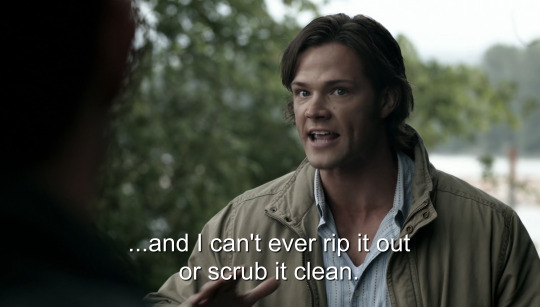
(4.04)

(4.21)
what got me started on this line of thinking was a recent rewatch of John Ford's The Searchers (1956), a movie so ingrained in the modern American cultural mythos that nearly every first year cinema studies course makes it required viewing lmao. it's a subversive Western, concerned with exploring the porous boundary dividing white settler communities from Native American communities, the defining line between the 'civilised'/'uncivilised', the colonial subject and the savage. it was released during an era when America was grappling with undoing laws around racial segregation, and reflects those anxieties through classic American mythology.
so. Sam is a modern interpretation of Martin and Debbie from that movie, and Dean is a modern variant on its leading anti-hero, Ethan Edwards (rather John is our initial Ethan figure, but we spend most of the show with Dean, who takes on his mantle). just to emphasise the connection between the show and this movie - Star Wars heavily references it, and Kripke's always been explicit about this show's two leads as Luke Skywalker and Han Solo. well, i'd argue this show definitely owes more to The Searchers than Star Wars does!
Martin is Ethan's adoptive nephew of partial Cherokee descent, made an outsider to his family, by his uncle, at the film's outset due to his blood. he joins his uncle on his revenge mission after a Comanche tribe destroys their home and steals his adoptive sister - Debbie. this mission becomes his coming-of-age journey into rugged frontier manhood, as much as it is his path towards integration into white, 'civilised' society.

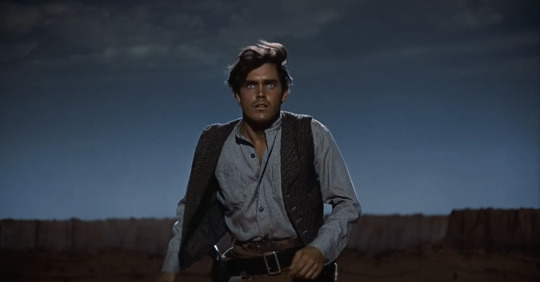
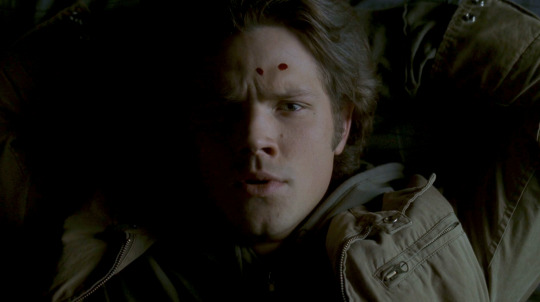

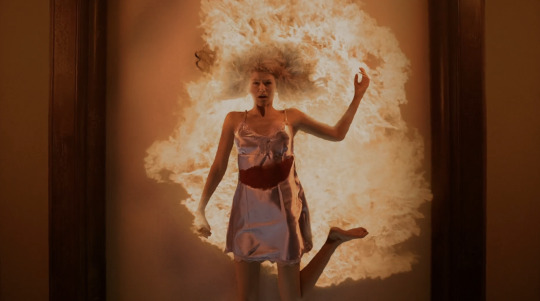
the protagonist of the film is Ethan, a soldier who gets consumed by his seven year long, bloody, vengeance-fuelled quest to recover his niece. when he finds Debbie, however, to his dismay he discovers she's no longer the 'pure' innocent he remembers. upon finding out that she's married to the tribe's chief - he literally disowns her as his blood kin, and at one point, even tries to kill her. Martin becomes the one to save her from his uncle's shot and the one to convince her to return home. he later convinces Ethan to recommit to rescuing her, and he ends up doing so.
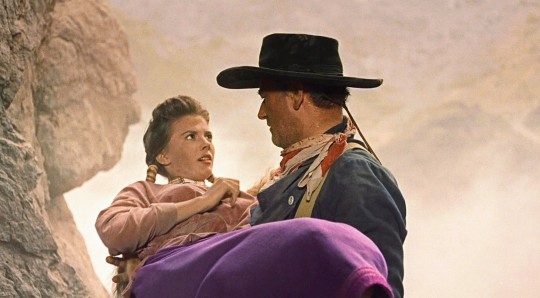



(15.17 - Sam over s4 functions as a Debbie figure, but Jack also takes up her role. Dean disowns him as Ethan disowns his niece)
over the movie, we see Ethan descend into ever increasing violence and 'wildness', grown closer to his enemy after years spent on the frontier, hunting them down. Martin gets to go home, his civilising mission completed as he marries into a white family. Ethan though, stands at the threshold in the iconic concluding shot below. he's been transformed by frontier violence to the point he no longer belongs to the domestic, civilised world. he wanders back out into the desert, alone.

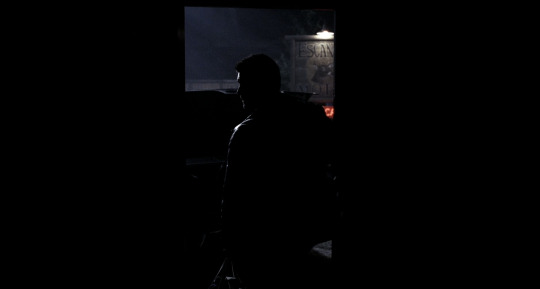
(1.14)
anyways. Supernatural owes so much of its dna to the classic Western, and to this movie in particular. what The Searchers was to collective white American anxieties over desegregation in the late 50s, this show was to collective white American anxieties over multiculturalism at the new millenium, in the wake of 9/11. Sam's demon blood is a critical defining line between him and his brother, as Martin's mixed race status is the defining line between him and his uncle. 'monstrosity' on this show metaphorically stands in for savagery; one brother gets thrown out onto the frontier, a journey towards 'taming' his own nature. and another brother drifts further and further away from civilised society the longer he spends fighting at the frontier, protecting civilisation from its monsters. 'blood don't end with family' comes to a screeching halt when it addresses the prospect of monstrosity. what is demon blood standing in for on this show? what does a monster represent, truly? who gets to step over the threshold into civilised society, and what is the price of that acceptance?
#spn#spn meta#incoherently kicking the hornet's nest!!! and now time to pass out#would love to see more analysis of the show through its references/tropes/archetypes tbh#all fifteen seasons of supernatural: john ford's the searchers (1956)#this show's brilliance lies in its marriage of cultural anxieties across genres -> classic westerns + modern (80s-90s) horror#“racism is the curse of the american soul”#my meta#supernatural is a modern western#j.txt
97 notes
·
View notes
Text
You:

Me:

Okay, but actually, just to answer this for you and to clue in others who might not know this particular bit of comics:
Back near the fucking start of the American comics industry - and the literal gestating period of superhero comics - you have Detective Comics, founded in 1937. Starting as an anthology comic (which was pretty common in the time) with "hard-boiled detective" stories, they told a lot of wacky (and...badly-aging) stories about detectives and those they faced.
And, showing up as of Detective Comics #27 back in 1939?

The whole 'punching people in the face' and 'brooding in the shadows' bit that a lot of people like to focus on? There's roots of that as far as the early days - I mean, he is marked as a superhero, and that goes as you expect - but part of the thing that defined Batman's persistence as a character from 1939 to present day was the fact he's seen as the penultimate detective in that setting.

And, a comical one but one that shows the actual term used in-universe:

Part of the "World's Greatest Detective" bit is since it's also marked up that part of how he keeps up with varying superpowered threats - and is strong enough to stand amongst the rest of the superpowered Justice League - is he's a good enough detective to know all of their weaknesses or to otherwise foil or defuse their plans. This is usually more memetic than grounded in depiction at this point, but the recent 2022 The Batman is actually a phenomenal example of him trying to unravel the elaborate puzzles being left for him (and the traps left waiting in their shadows).
But yeah, whether one agrees with Batman actually being a good detective - or if one wishes to diverge to arguing he might be a detective but he's not truly a detective story and thus should be excluded on that alone - is not the main bit. The main bit is he's been marked up as his world's greatest detective for multiple decades in comics and by fans, enough its become memetic, and...
Well, yeah, I can definitely see banning him just to try and get a more clear result for the other candidates.
OTHER THAN BATMAN AND SHERLOCK
2K notes
·
View notes
Text
Said it before and I'll say it again. You can just say "kids media tends to have certain qualities that appeal to me more than adult-targeted media" instead of insisting it's somehow more enlightened than media for fully-grown humans.
#THE QUALITY OF A WORK IS NOT DETERMINED BY ITS DEMOGRAPHIC AND YOU NEED TO FUCKING READ A WIDE VARIETY OF GENRES IF YOU WANT PEOPLE TO TAKE#YOUR ANALYSIS SERIOUSLY. GOD. FUCK. *bangs my head on a wall for a thousand years*
44 notes
·
View notes